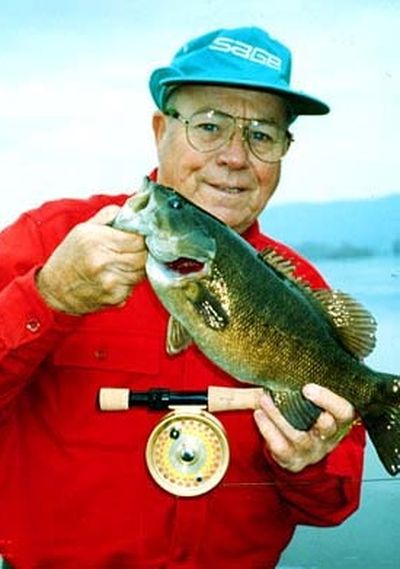Fly-fishing pioneer Kreh shapes lore of sport

BALTIMORE – Lefty Kreh is to fly fishing what James Naismith was to basketball and, perhaps, Elvis to rock ‘n’ roll.
Kreh is credited with helping invent the sport in the late 1940s and later popularized it by writing more than 30 books plus a newspaper outdoors column. He was one of the first popular fly fishers to travel the country and world giving clinics and lectures on the sport.
Kreh, 87, who is still active in the sport, recently talked about his sport.
Q: How did you start writing about the outdoors?
A: At that time, The Baltimore Sun was one of the few newspapers that had an outdoors column. There were only four hunting and fishing magazines in the country. You had 13 million servicemen coming home from the war who loved to hunt and fish. I was always one to write about how to do it, where to do it, when to do it. They just gobbled the thing up.
Q: What was the motivation for popularizing fly fishing?
A: Joe Brooks used to live in Baltimore. I got a reputation for being sort of a hot-dog fisherman. Spinning was just coming into the country. Brooks asked me if I would take him fishing. That was the first time I ever saw a fly rod. He gave me a fly-casting lesson. I got hooked on it.
I mainly fished for smallmouth bass. I knew that the longer you could swim the fly through the water, the more opportunity you had for catching fish. The old method where your arm came up to your ear and back down again, which was developed in the 14th century, that didn’t work as well (with a fly rod). I did an article for Outdoor Life, they got all kinds of criticism for it because it was against tradition. That’s where the modern method of fly-casting started.
In 1964, Joe Brooks got me a job at The Miami Herald running the largest fishing tournament in the world. I was getting so many letters about how you fish for this or that, I wrote a book called “Fly Fishing in Saltwater.” A lot of reviewers called it the “Koran of saltwater fly fishing.”
Q: Is modern fly fishing as pure a sport as it once was?
A: It’s expanded. When I began fly-fishing, there was no one to go to. You learned on your own. After those organizations were formed, they formed chapters. Then you had books come out. There are probably more books written on fly fishing than any other sport. Then you had the VCRs and the DVDs. You have a tremendous amount of dispensing of information on how to tie flies, how to fish, how to cast. I have done eight or nine videos myself. Not only do you have more people fly fishing, but you have more knowledge available. With the equipment, everything is vastly improved.
Q: Speaking of TV shows devoted to fishing, do you think fishing can become a popular spectator sport?
A: No, because the money’s not in it. They’re catering to younger people. Even the fishing and hunting shows we’ve had have declined. They’re trying to sell the ads to young people, but the truth is, most of the people who hunt and fish are over 40 years of age, an awful lot over 50.
Q: What about fly-fishing tournaments?
A: Competition is almost foreign to fly fishing. Most fly fisherman enjoy helping each other.
In bass fishing, competition is very successful because you have a different culture. They enjoy competing with each other. My own personal philosophy is that when you compete with someone, you become their competitor. If you help people, you become their friends. Almost all fly fishermen I know do not sanction tournament-type fishing.
Q: You threatened to get a lawyer when Baltimore proposed naming a lake after you. If not the name on a lake, what do you want your legacy to be?
A: I know my inabilities, so I know that I’m not that impressed with me. I just hope people enjoy what I did.